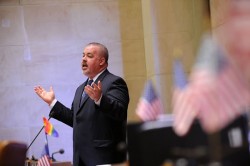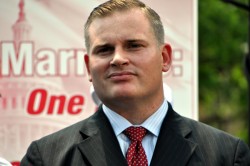National
Gay assemblyman introduces N.Y. marriage bill
Anti-gay group launches attack ads opposing measure

New York Assemblyman Daniel O’Donnell (D-Manhattan), the gay brother of TV personality Rosie O’Donnell, introduced a bill this week to legalize same-sex marriage in the state.
O’Donnell’s action appears to have broken ranks with New York’s Democratic governor, Andrew Cuomo, who promised to introduce marriage equality legislation but has hesitated in doing so just weeks before the state legislature is scheduled to adjourn for the year.
Cuomo, a strong backer of same-sex marriage, reportedly has persuaded a coalition of LGBT advocacy groups campaigning for a marriage bill to support his plan to hold off on introducing the bill until enough votes could be lined up to pass it in the Republican-controlled state Senate.
“It is with great pride that I am introducing the Marriage Equality Act,” O’Donnell said in a statement. “Since the Assembly last passed the bill in 2009, there has been an overwhelming groundswell of support for marriage equality across our state.”
The Democratic-controlled Assembly has passed a same-sex marriage bill three times since 2007, and this is the fourth time O’Donnell has emerged as the lead sponsor of the bill. But the bill lost in the Senate in 2009 by an eight-vote margin at a time when Democrats controlled the body. It was the first time the Senate had taken a vote on the measure.
Josh Vlasto, a spokesperson for Cuomo, told the New York Times on Tuesday that the governor remains committed to seeing the bill pass before the legislature adjourns at the end of June.
“The question has never been the Assembly,” Vlasto told the Times. “The question has always been whether there are the votes in the Senate, and that remains the question.”
Vlasto’s comments came at a time when many political observers in the state were hopeful that between four and six Republican senators would join as many as 28 Senate Democrats to secure the bill’s passage. Most observers expect the Assembly to once again approve the bill.
Republicans have a 32-30 majority in the 62-member Senate.
Supporters, led by a coalition of LGBT groups, including the Empire State Pride Agenda (ESPA) and the Human Rights Campaign, have pointed to a recent public opinion poll showing that 58 percent of New Yorkers support the right of gay and lesbian couples to marry.
Advocates for the bill also note that Cuomo, who has a high public approval rating, is aggressively lobbying both Democratic and Republican lawmakers to vote for a marriage equality bill that he says he wants to personally introduce.
“We think the environment is strong,” said ESPA Executive Director Ross Levi. “To have such a popular governor so forcefully behind it, to have the public so solidly on our side at 58 percent, to have the LGBT community and so many strong allies working closely and coordinated together creates a good environment to work on this and achieve victory,” he said.
In a development that was long expected, the anti-gay National Organization for Marriage announced this week it is launching a $500,000 TV ad campaign to defeat the marriage bill. The group has also vowed to spend $1 million to defeat any Republican lawmaker who votes for the bill and to support the re-election of any Democratic legislator who votes no on the bill.
“It’s become quite clear in recent days in New York that Gov. Cuomo and same-sex marriage advocates are targeting a select number of Democrat state senators, as well as some Republicans, in their desperate attempt to coerce legislators to support their agenda,” said NOM President Brian Brown.
“We want to be sure those courageous Democrats and Republicans who cast their vote of conscience in favor of traditional marriage will have a strong supporter if the radical gay activists come after them in their next election,” Brown said.
Similar to its practice in other states, NOM’s TV ad opposing the bill, which aired on TV stations this week, claims that legalizing same-sex marriage would result in elementary schools teaching children about gay marriage and how it benefits society.
The Human Rights Campaign has responded by launching its own campaign to challenge the NOM ads, saying the group is falsely linking marriage equality to school curricula.
“We’re fighting for loving committed gay and lesbian couples going down to the courthouse to get married, which has absolutely nothing to do with what is taught in schools,” said HRC President Joe Solmonese. “The ad is a piece of fiction,” he said. “School districts determine what is taught in schools.”
NOM’s Brown argues that the “message” it conveys in its TV ads has resonated in all states in which same-sex marriage bills have come before voters in a referendum. He said NOM’s campaign against same-sex marriage also has been successful in states where gay marriage surfaced in legislatures.
“In Maryland and Rhode Island we just won great victories for marriage,” he said. “Our opponents tried to claim that same-sex marriage was inevitable in both states. They were wrong. Once our message got out and legislators heard from their constituents, same-sex marriage was stopped dead,” he said. “We expect the same to happen in New York.”
Levi said the New York coalition working to pass marriage equality legislation has learned from mistakes made by advocates in other states, including Maryland.
The coalition, called New Yorkers United for Marriage, includes ESPA, HRC, Freedom to Marry, and Log Cabin Republicans. It has launched its own TV ads in support of the marriage equality bill in all parts of the state, according to Levi.
He said more than 1,200 LGBT advocates and their allies descended on the state capital in Albany on Monday in an ESPA-led rally in support of the marriage bill. Participants, among other things, visited the offices of senators as Assembly members to urge them to vote for the measure.
HRC, meanwhile, has been releasing a series of videos in the state featuring testimonials in support of the bill by celebrities, including actors Julianne Moore and Sam Waterston and President George W. Bush’s daughter, Barbara Bush. Former President Bill Clinton issued a written statement supporting the bill last week.
New York Rangers star hockey player Sean Avery surprised the sports world by agreeing to appear in one of HRC’s videos expressing strong support for the marriage bill, becoming one of the nation’s first major sports figures to embrace a gay rights issue.
Levi said the timing of introducing a same-sex marriage bill in the New York Legislature isn’t as important as securing the support from the speaker of the Assembly and the majority leader of the Senate, who have full control over which bills come up for a vote. The Assembly speaker has long been supportive of the bill.
Senate Majority Leader Dean Skellos (R-Long Island) has said he would allow the bill to reach the Senate floor for a vote even though Skellos announced he would vote against it.
According to Levi, the November 2010 election in New York resulted in at least two more senators who have publicly committed to voting for the marriage measure. But Levi was cautious about predicting the outcome of a Senate vote, saying he was optimistic that the bill would pass.
“We’re not taking anything for granted and we’re working carefully in both chambers, particularly talking to new legislators about why this issue is important,” he said. “We’re doing that in both the Assembly and the Senate.”
U.S. Supreme Court
Supreme Court to consider bans on trans athletes in school sports
27 states have passed laws limiting participation in athletics programs

The U.S. Supreme Court on Thursday agreed to hear two cases involving transgender youth challenging bans prohibiting them from participating in school sports.
In Little v. Hecox, plaintiffs represented by the ACLU, Legal Voice, and the law firm Cooley are challenging Idaho’s 2020 ban, which requires sex testing to adjudicate questions of an athlete’s eligibility.
The 9th U.S. Circuit Court of Appeals described the process in a 2023 decision halting the policy’s enforcement pending an outcome in the litigation. The “sex dispute verification process, whereby any individual can ‘dispute’ the sex of any female student athlete in the state of Idaho,” the court wrote, would “require her to undergo intrusive medical procedures to verify her sex, including gynecological exams.”
In West Virginia v. B.P.J., Lambda Legal, the ACLU, the ACLU of West Virginia, and Cooley are representing a trans middle school student challenging the Mountain State’s 2021 ban on trans athletes.
The plaintiff was participating in cross country when the law was passed, taking puberty blockers that would have significantly reduced the chances that she could have a physiological advantage over cisgender peers.
“Like any other educational program, school athletic programs should be accessible for everyone regardless of their sex or transgender status,” said Joshua Block, senior counsel for the ACLU’s LGBTQ and HIV Project. “Trans kids play sports for the same reasons their peers do — to learn perseverance, dedication, teamwork, and to simply have fun with their friends,” Block said.
He added, “Categorically excluding kids from school sports just because they are transgender will only make our schools less safe and more hurtful places for all youth. We believe the lower courts were right to block these discriminatory laws, and we will continue to defend the freedom of all kids to play.”
“Our client just wants to play sports with her friends and peers,” said Lambda Legal Senior Counsel Tara Borelli. “Everyone understands the value of participating in team athletics, for fitness, leadership, socialization, and myriad other benefits.”
Borelli continued, “The U.S. Court of Appeals for the Fourth Circuit last April issued a thoughtful and thorough ruling allowing B.P.J. to continue participating in track events. That well-reasoned decision should stand the test of time, and we stand ready to defend it.”
Shortly after taking control of both legislative chambers, Republican members of Congress tried — unsuccessfully — to pass a national ban like those now enforced in 27 states since 2020.
Federal Government
UPenn erases Lia Thomas’s records as part of settlement with White House
University agreed to ban trans women from women’s sports teams

In a settlement with the Trump-Vance administration announced on Tuesday, the University of Pennsylvania will ban transgender athletes from competing and erase swimming records set by transgender former student Lia Thomas.
The U.S. Department of Education’s Office for Civil Rights found the university in violation of Title IX, the federal rights law barring sex based discrimination in educational institutions, by “permitting males to compete in women’s intercollegiate athletics and to occupy women-only intimate facilities.”
The statement issued by University of Pennsylvania President J. Larry Jameson highlighted how the law’s interpretation was changed substantially under President Donald Trump’s second term.
“The Department of Education OCR investigated the participation of one transgender athlete on the women’s swimming team three years ago, during the 2021-2022 swim season,” he wrote. “At that time, Penn was in compliance with NCAA eligibility rules and Title IX as then interpreted.”
Jameson continued, “Penn has always followed — and continues to follow — Title IX and the applicable policy of the NCAA regarding transgender athletes. NCAA eligibility rules changed in February 2025 with Executive Orders 14168 and 14201 and Penn will continue to adhere to these new rules.”
Writing that “we acknowledge that some student-athletes were disadvantaged by these rules” in place while Thomas was allowed to compete, the university president added, “We recognize this and will apologize to those who experienced a competitive disadvantage or experienced anxiety because of the policies in effect at the time.”
“Today’s resolution agreement with UPenn is yet another example of the Trump effect in action,” Education Secretary Linda McMahon said in a statement. “Thanks to the leadership of President Trump, UPenn has agreed both to apologize for its past Title IX violations and to ensure that women’s sports are protected at the university for future generations of female athletes.”
Under former President Joe Biden, the department’s Office of Civil Rights sought to protect against anti-LGBTQ discrimination in education, bringing investigations and enforcement actions in cases where school officials might, for example, require trans students to use restrooms and facilities consistent with their birth sex or fail to respond to peer harassment over their gender identity.
Much of the legal reasoning behind the Biden-Harris administration’s positions extended from the 2020 U.S. Supreme Court case Bostock v. Clayton County, which found that sex-based discrimination includes that which is based on sexual orientation or gender identity under Title VII rules covering employment practices.
The Trump-Vance administration last week put the state of California on notice that its trans athlete policies were, or once were, in violation of Title IX, which comes amid the ongoing battle with Maine over the same issue.
New York
Two teens shot steps from Stonewall Inn after NYC Pride parade
One of the victims remains in critical condition

On Sunday night, following the annual NYC Pride March, two girls were shot in Sheridan Square, feet away from the historic Stonewall Inn.
According to an NYPD report, the two girls, aged 16 and 17, were shot around 10:15 p.m. as Pride festivities began to wind down. The 16-year-old was struck in the head and, according to police sources, is said to be in critical condition, while the 17-year-old was said to be in stable condition.
The Washington Blade confirmed with the NYPD the details from the police reports and learned no arrests had been made as of noon Monday.
The shooting took place in the Greenwich Village neighborhood of Manhattan, mere feet away from the most famous gay bar in the city — if not the world — the Stonewall Inn. Earlier that day, hundreds of thousands of people marched down Christopher Street to celebrate 55 years of LGBTQ people standing up for their rights.
In June 1969, after police raided the Stonewall Inn, members of the LGBTQ community pushed back, sparking what became known as the Stonewall riots. Over the course of two days, LGBTQ New Yorkers protested the discriminatory policing of queer spaces across the city and mobilized to speak out — and throw bottles if need be — at officers attempting to suppress their existence.
The following year, LGBTQ people returned to the Stonewall Inn and marched through the same streets where queer New Yorkers had been arrested, marking the first “Gay Pride March” in history and declaring that LGBTQ people were not going anywhere.
New York State Assemblywoman Deborah Glick, whose district includes Greenwich Village, took to social media to comment on the shooting.
“After decades of peaceful Pride celebrations — this year gun fire and two people shot near the Stonewall Inn is a reminder that gun violence is everywhere,” the lesbian lawmaker said on X. “Guns are a problem despite the NRA BS.”
-

 U.S. Supreme Court4 days ago
U.S. Supreme Court4 days agoSupreme Court to consider bans on trans athletes in school sports
-

 Out & About4 days ago
Out & About4 days agoCelebrate the Fourth of July the gay way!
-

 Virginia4 days ago
Virginia4 days agoVa. court allows conversion therapy despite law banning it
-

 Opinions4 days ago
Opinions4 days agoCan we still celebrate Fourth of July this year?














